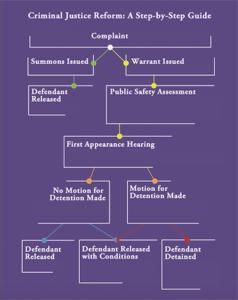When you are facing criminal charges in New Jersey, you need to hire a qualified and experienced criminal defense attorney. An experienced NJ defense attorney can play a critical role when you are facing any criminal charge. I am a board-certified criminal trial by the New Jersey Supreme Court. I handle countless criminal charges throughout the State of New Jersey on a daily basis, including pretrial detention hearings. I offer a free 30-minute strategy session to any potential client who is facing criminal charges or questions for a family member or loved one’s criminal case in New Jersey.
Is there Bail in New Jersey Anymore?
New Jersey’s legislature revamped the bail system. Under the old system, almost anyone charged with an offense in NJ was permitted to post a bail-bond to be released from jail even before going in front of a judge. Bail bondsmen would post a 10% surety bond of the full bail amount in order to release someone from jail. A family member or friend would co-sign a promissory note to pay the full amount if the defendant failed to appear in court.
Courts, lawmakers and prosecutors became enraged when it was published that bail bonds companies were only charging 1% of the full bail amount to release defendants. For example, someone with a $250,000 bail bond could get out of jail if a family member or friend put up just $2,500. The system hit a boiling point when defendants were released on 2 or 3 different cases and arrested again after posting multiple bails.
Just as bad were the defendants who had to sit in jail and cool their heels for months because they couldn’t afford as little as $100 to post bail in some cases. As a result, NJ did away with the bail system and implemented a whole new system.
Criminal Justice Bail Reform in New Jersey
 New Jersey overhauled its bail system and modeled it after the Federal System. New Jersey passed bail reform and implemented a “speedy trial” system. Under the new criminal justice bail reform, NJ did away with cash bails and bail bonds.
New Jersey overhauled its bail system and modeled it after the Federal System. New Jersey passed bail reform and implemented a “speedy trial” system. Under the new criminal justice bail reform, NJ did away with cash bails and bail bonds.
Now, police fingerprint a defendant and lookup a criminal history from the statewide database. This information is given to prosecutors who decide whether to issue the complaint on a summons or a warrant.
If a summons is issued, the defendant is released and not subject to criminal justice reform. If a warrant is issued, the defendant is lodged at the county jail and subject to the new criminal justice reform act.
What is a Public Safety Assessment?
Once a defendant is held on a warrant, pretrial services prepares a Public Safety Assessment (PSA) and makes a release recommendation to the Court. The PSA score factors in a defendant’s criminal history, likelihood to appear in court, and offenses charged. Crimes such as murder, and some guns and weapons offenses carry a recommendation of no release.
When is a Detention Hearing Scheduled?
A first appearance hearing is conducted within 24 to 48 hours of the arrest. At the first appearance, the prosecutor must make a motion to detain the defendant. If there is no motion for detention filed, the judge can release the defendant subject to conditions recommended by pretrial services and the prosecutor. If a motion for detention is filed by the prosecutor, a detention hearing must be scheduled within 3 to 5 days. The prosecutor has the burden to establish probable cause for the offenses and prove that no condition of release can reasonably assure the public’s safety or that the defendant will appear in court.
The pretrial detention hearing is one of the most important proceedings after a defendant is arrested. At the hearing, the judge will decide whether to release the defendant or detain the defendant. If the defendant is released, he is given a date to return to court. Most defendants are released with conditions that are monitored by pretrial services. If the defendant is detained, the defendant must remain in jail until the case is over.
What Happens if I am Detained?
Defendants who are detained can file an appeal within 7 days of the court’s order to detain. The court rules also allow a defendant to reopen the detention hearing anytime if there is new evidence or changed circumstances in the case. Finally, a detained defendant must be indicted within 90 days or tried within 180 days or may be released pursuant to the speedy-trial guidelines.
Contact My Office Immediately
If you are facing criminal charges, or your family was arrested in New Jersey, you need to consult with an experienced criminal lawyer. I am board certified as a certified criminal trial attorney by the New Jersey Supreme Court. I have handled pretrial detention motions, pretrial detention appeals and have reopened pretrial hearings since the inception of criminal justice reform in NJ. I understand how the PSA is used in detention hearings, how to fight probable cause, and how to skillfully craft arguments for your release so you do not have to sit in jail until your case is over. Please contact me now by email, by phoning 908.264.7701, or by completing the form to the right to schedule your complimentary 30-minute strategy session.

